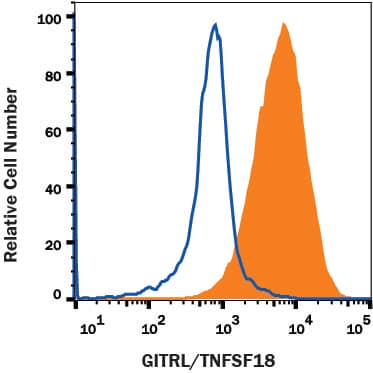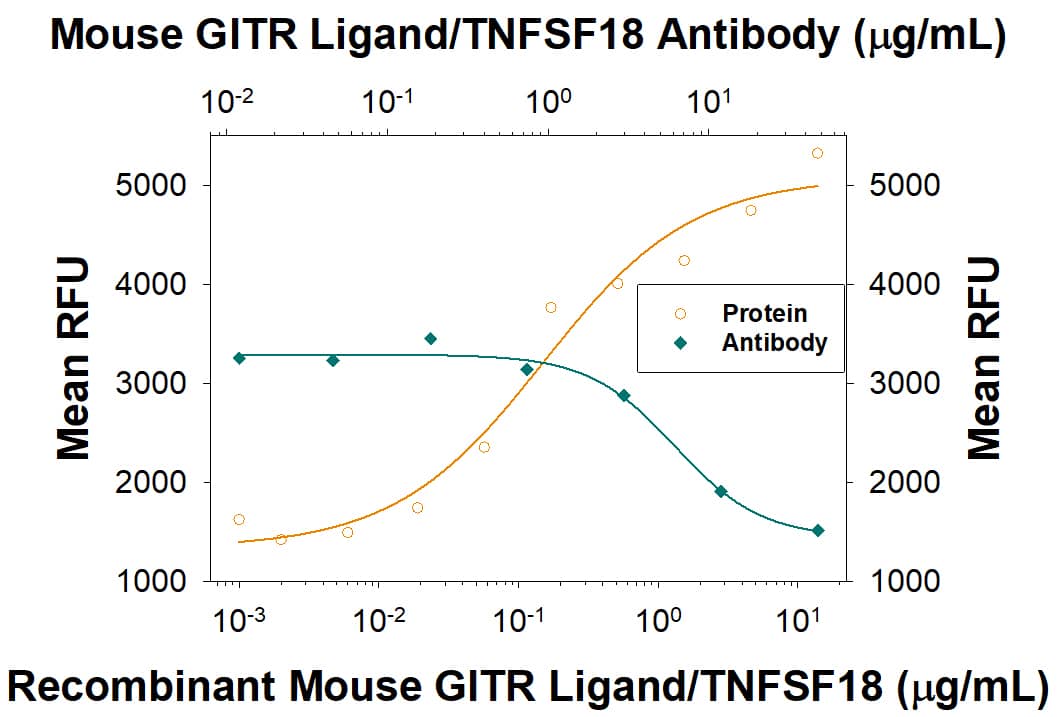Mouse GITR Ligand/TNFSF18 Antibody
R&D Systems, part of Bio-Techne | Catalog # MAB21773


Key Product Details
Species Reactivity
Applications
Label
Antibody Source
Product Specifications
Immunogen
Thr47-Ser173
Accession # Q7TS55
Specificity
Clonality
Host
Isotype
Endotoxin Level
Scientific Data Images for Mouse GITR Ligand/TNFSF18 Antibody
Detection of GITR Ligand/TNFSF18 in NS0 Cell Line Transfected with Mouse GITR Ligand/TNFSF18 by Flow Cytometry.
NS0 cell line transfected with either mouse GITR Ligand/TNFRSF18 (filled histogram) or irrelevant protein (open histogram) was stained with Rat Anti-Mouse GITR Ligand/TNFRSF18 Monoclonal Antibody (Catalog # MAB21773) followed by Allophycocyanin-conjugated Anti-Rat IgG Secondary Antibody (Catalog # F0113). View our protocol for Staining Membrane-associated Proteins.Cell Proliferation Induced by GITR Ligand/TNFSF18 and Neutralization by Mouse GITR Ligand/TNFSF18 Antibody.
In the presence of Rat Anti-Mouse CD3 Monoclonal Anti-body (0.5 µg/mL, MAB4841) and a cross-linking antibody, Mouse Anti-His Tag Monoclonal Antibody (10 µg/mL, MAB050), Recombinant Mouse GITR Ligand/TNFSF18 (2177-GL) stimulates proliferation in mouse CD4+T cells in a dose-dependent manner (orange line), as measured by Resazurin (AR002). Under these conditions, proliferation elicited by Recombinant Mouse GITR Ligand/TNFSF18 (2 µg/mL) is neutralized (green line) by increasing concentrations of Rat Anti-Mouse GITR Ligand/ TNFSF18 Monoclonal Antibody (Catalog # MAB21773). The ND50 is typically 1.2-12 µg/mL.Applications for Mouse GITR Ligand/TNFSF18 Antibody
CyTOF-ready
Flow Cytometry
Sample: NS0 Cell Line Transfected with Mouse GITR Ligand/TNFSF18
Neutralization
Formulation, Preparation, and Storage
Purification
Reconstitution
Formulation
Shipping
Stability & Storage
- 12 months from date of receipt, -20 to -70 °C as supplied.
- 1 month, 2 to 8 °C under sterile conditions after reconstitution.
- 6 months, -20 to -70 °C under sterile conditions after reconstitution.
Background: GITR Ligand/TNFSF18
Glucocorticoid-induced TNF receptor superfamily-related protein ligand (GITRL) is a member of the TNF superfamily (TNFSF) and has been designated TNFSF18. Mouse GITRL cDNA encodes a 173 amino acid (aa) type II membrane protein with a C-terminal extracellular domain of 131 aa, an N-terminal cytoplasmic domain of 23 aa and a transmembrane domain of 19 aa. It shares approximately 60% aa sequence identity with human GITRL (2). Mouse GITRL is expressed at high levels in macrophages, dendritic cells and B cells. The expression is transiently upregulated by LPS stimulation. GITRL binds to the type I transmembrane protein GITR/TNFRSF18, which is a member of the TNF receptor superfamily that is predominantly expressed on CD25+ regulatory CD4+ T cells (Treg). GITR is also expressed on naïve CD4+ CD25- T cells, where its expression is upregulated after antigen-driven activation (1, 2). Ligation of GITR has been found to induce nuclear factor (NF)-kappa B activation via TNF receptor-associated factor 2. GITRL provides costimulatory signals for activated CD4+ CD25- T cells to enhance cell proliferation and augment cytokine production. On CD4+ CD25+ Treg cells, GITRL also provides costimulatory signals to induce proliferation, setting Treg cells in an active/hyperproliferactive state that reverses the suppressive function of Treg cells. GITRL-GITR ligation provides important costimulatory signals that play important roles in modulating diverse T cell functions (1-4).
References
- Tone, M. et al. (2003) Proc. Natl. Acad. Sci. USA 100:15059.
- Ji, H. et al. (2004) J. Immunology 172:5823.
- Kanamaru, F. et al. (2004) J. Immunology 172:7306.
- Ronchetti, S. et al. (2004) Eur. J. Immunology 34:613.
Long Name
Alternate Names
Gene Symbol
UniProt
Additional GITR Ligand/TNFSF18 Products
Product Documents for Mouse GITR Ligand/TNFSF18 Antibody
Product Specific Notices for Mouse GITR Ligand/TNFSF18 Antibody
For research use only
